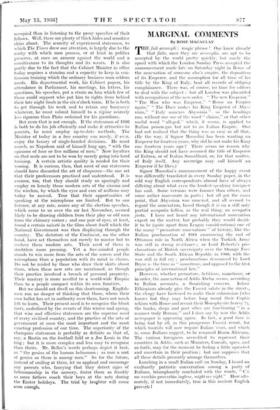MARGINAL COMMEN'T'S
By ROSE MACAULAY
THE fait accompli : magic phrase ! One knew already that faits, once they are aceomplis, are apt to be accepted by the world pretty quickly, but surely the speed with which the London Sunday Press accepted the announcement made late on Saturday night in Rome of the annexation of someone else's empire, the deposition of its Emperor, and the assumption for all time of his title by the King of Italy, beat all records of obliging complaisance. There was, of course, no time for editors to deal with the subject ; but all London was placardtsi with recognitions of the new order. " The new Emperor," " The Man who was Emperor," " Rome an Empire again." " The Duce makes his King Emperor of .Abys- sinia," " Italy annexes Abyssinia "—so the headings ran, without one use of the word " claims," or that other useful word " alleged," which, it seems, is applied to Italian poison-gas but not to an Italian Empire. One had not realised that the thing was as easy as all that. (By the way, if Signor Mussolini has been wanting an Emperor for fourteen years, why did he not make his King one fourteen years ago ? There seems no reason why the King should not have assumed the title of Emperor of Eritrea, or of Italian Somaliland, or, for that matter, of Italy itself. Any sovereign may call himself an Emperor if he likes.) Signor Mussolini's announcement of the happy event was differently translated in every Sunday paper, in the odd way English correspondents abroad have of always differing about what even the loudest-speaking foreigner has said. Some versions were funnier than others, and some rather inaccurate in parts ; but all got the main point, that Abyssinia was annexed, and all seemed to regard the annexation, based though it is on a still only partial oecupatio bailee', as the real thing, an oecupatio justa. I have not heard any international annexation expert on the matter, but probably they would decide it to be (quite apart from League considerations) one of the many " premature annexations " of history, like the Italian proclamation of 1911 announcing the end of Ottoman rule in North Africa when the Turkish Army was still in strong resistance ; or Lord Roberts's pro- clamations of British sovereignty over the Orange Free State and the South African Republic in 1000, with the war still in full cry ; proclamations denounced by Lord 13ryce a,• the time as " monstrous, and opposed to the first principles of international law."
However, whether premature, fictitious, monstrous, or in order, the annexation of Addis Abeba scents, according to Italian accounts, a flourishing concern. Infant Ethiopians already give the Fascist salute in the streets, the clergy have hastened to make their submission (who knows but they may before long mend their Coptic schism with Rome and recant their Monophysite heresy ?), the banks, shops and post office arc functioning " in a manner truly Roman," and I dare say by now the Addis newspaper is appearing again. In fact, a good time is being had by all, in this prosperous Fascist resort, for which tourists will now require Italian visas, and which is, some Italians suggest, to be renamed Roma Africana. The various foreigners accredited to represent their countries in Addis, such as Ministers, Consuls, spies, and so forth, may for the moment be feeling a. little uprooted and uncertain in their position ; but one supposes that all these details presently arrange themselves.
Lunching in a small Italian café on Sunday, I heard an exultantly patriotic conversation among a party of Italians, triumphantly concluded with the words, " C'e un vecchio proverbio inglese, might ees right." How ulti- mately, if not immediately, true is this ancient English proverb I






















































 Previous page
Previous page